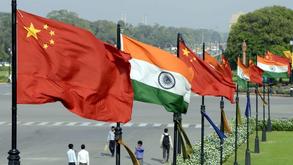 Indian and Chinese national flags flutter side by side at the Raisina hills in New Delhi, India, in this undated file photo. (PHOTO / XINHUA)
Indian and Chinese national flags flutter side by side at the Raisina hills in New Delhi, India, in this undated file photo. (PHOTO / XINHUA)
Chinese State Councilor and Foreign Minister Wang Yi and Indian External Affairs Minister Subrahmanyam Jaishankar explored bilateral issues during a meeting in Bali, Indonesia on Thursday.
Their hour-long discussion took place on the sidelines the Group of 20 (G20) foreign ministers’ meeting and included talks on boundary issues in eastern Ladakh region, the return of Indian students to China, and the resumption of direct flight services between the two countries.
Their hour-long discussion took place on the sidelines the Group of 20 (G20) foreign ministers’ meeting and included talks on boundary issues in eastern Ladakh region, the return of Indian students to China, and the resumption of direct flight services between the two countries
Wang told his Indian counterpart that both their countries had effectively managed and controlled their differences and bilateral relations have generally shown momentum in recovery.
Jaishankar reiterated that India-China relations are “best served by observing the three mutuals – mutual respect, mutual sensitivity and mutual interests”, according to a statement of the Indian side.
Jaishankar tweeted: “Began my day in Bali by meeting FM Wang Yi of China. Discussion lasted one hour. Focused on specific outstanding issues in our bilateral relationship pertaining to the border situation. Also spoke about other matters including students and flights.”
ALSO READ: BRICS: China, India aim to safeguard common interests
“Shared perspectives on the international situation and its impact on the G20 deliberations,” he said.
This is the first time the two ministers have met since Wang’s visit to New Delhi in March.
Recalling the disengagement achieved in some border areas where there had been tensions, Jaishankar called for sustained momentum to complete the disengagement.
They also discussed resuming direct flights between the two countries, which were suspended since March 2020 due to the pandemic.
Hundreds of Indian students who were studying in China before the pandemic have been unable to return to China for over two years due to COVID-19 restrictions.
According to the statement, Jaishankar reaffirmed the importance of “fully abiding by bilateral agreements and protocols, and the understandings reached between the two ministers during their previous conversations.”
ALSO READ: More trust urged for Sino-Indian relations
“In this regard, both ministers affirmed that the military and diplomatic officials of the two sides should continue maintaining regular contact and looked forward to the next 16th round of Senior Commanders’ meeting at an early date,” the statement reads.
The Bali meeting is significant as both sides are exploring ways of restoring normalcy while maintaining the conversation about boundary disputes, said Professor Alka Acharya, of the Centre for East Asian Studies at Jawaharlal Nehru University’s School of International Studies, New Delhi.
The two countries’ bilateral relations were further complicated, experts said, when one of China’s top automakers, Great Wall Motor, on July 2 had to drop plans to invest $1 billion in India and laid off employees at its operations after failing to obtain regulatory approvals.
Meanwhile, India’s Enforcement Directorate continued searches on Tuesday and Wednesday at premises of Chinese smartphone manufacturer Vivo and its dealers in connection with an alleged money laundering case. Vivo had stated that it followed Indian regulations.
ALSO READ: Wang's India visit carries significance for bilateral ties, global affairs
The Chinese Embassy in India on Wednesday urged the Indian side to effectively provide a "fair, just and non-discriminatory business environment” for Chinese enterprises to invest and operate in India.
In response to media queries on the raid, spokesperson of Chinese Embassy in India Counselor Wang Xiaojian said China "wishes the Indian side to investigate and enforce the law in compliance with laws and regulations."
"The frequent investigations by the Indian side into Chinese enterprises not only disrupt the enterprises' normal business activities and damage the goodwill of the enterprises, but also impedes the improvement of the business environment in India and chills the confidence and willingness of market entities from other countries, including Chinese enterprises, to invest and operate in India," Wang said.
"The essence of China-India economic and trade cooperation is for mutual benefit and win-win results," the spokesperson added.
READ MORE: China, India hold 15th corps commander level meeting
He said China-India trade volume has reached a historical record of over $100 billion in 2021, which, he noted, "reflects the huge potential and broad prospect of economic and trade cooperation between our two countries."
"The Chinese government always asks Chinese enterprises to abide by laws and regulations overseas and firmly supports Chinese enterprises in safeguarding their legitimate rights and interests," Wang said.
With Xinhua inputs


